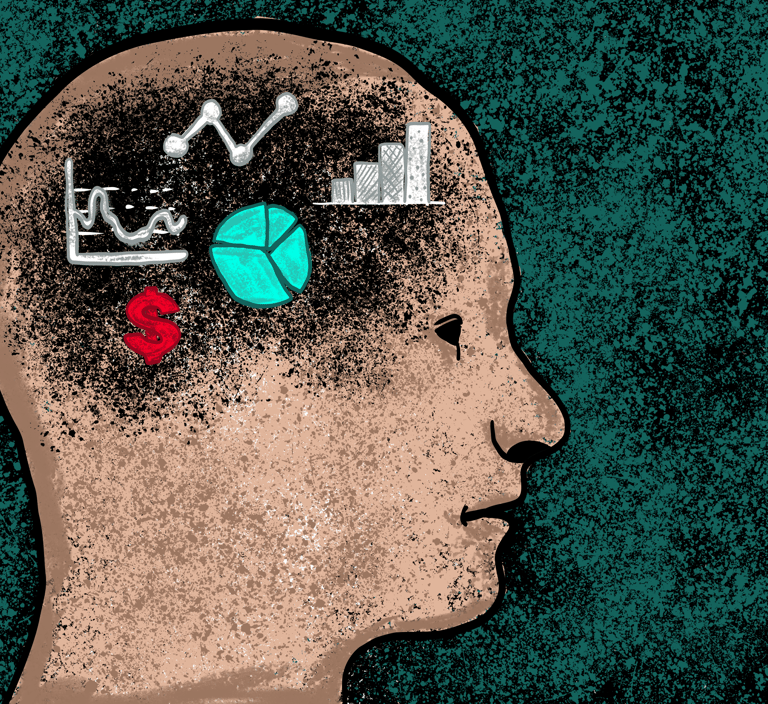Strategizing from 7 cities across the globe
Brain Economics: The Economic Value of a Flourishing Mind
Part I: A Rational Look at human capital
Abstract
The first part delves into the critical, often overlooked, intersection of brain function, individual well-being, and economic prosperity. Traditionally, economic analysis has focused heavily on material inputs and outputs, treating human workers mechanistically, a perspective understandable during early industrialization when physical capacity was key. However, this view is profoundly inadequate in our increasingly knowledge-based economy, where individual and societal productivity hinges critically on the state of the collective brains. The wellness of the mind is not merely a secondary concern or a benefit offered when profits allow, but is identified as a fundamental factor of production, a multiplier of growth, and an essential investment for long-term economic success.
Just as a complex machine requires finely tuned components and a stable environment, the human brain's ability to innovate, adapt, and create value is inextricably linked to an individual's overall well-being. Conceptualizing this link through interconnected domains reveals that deficits in one area can undermine others, diminishing overall cognitive and productive capacity. Drawing on insights into individual wellness and the World Health Organization's perspective on brain health, the report identifies key areas forming the bedrock of a high-functioning brain economy: Physical Integrity, emphasizing that adequate nutrition, regular physical activity, sufficient sleep, and general health maintenance are critical inputs for cognitive function, mood regulation, and resilience, with organizations recognizing this seeing tangible returns in reduced absenteeism and increased productivity. Mental and Emotional Equilibrium is central, highlighting the capacity to process information, manage stress, and regulate emotions as vital for workplace effectiveness, with chronic stress, anxiety, and unmanaged emotional states leading to burnout, reduced productivity, and increased turnover – a significant economic drain. Cultivating a supportive environment with mental health resources and psychological safety is deemed a strategic investment in creativity, innovation, and sound decision-making. Social Connectivity is vital as humans are inherently social, and brains are wired for connection; a sense of belonging and supportive relationships are crucial for mental well-being and effective collaboration, while social exclusion can be as detrimental as physical pain. Financial Security significantly impacts mental state and cognitive capacity, as the stress of financial insecurity diverts mental resources, impairs decision-making, and contributes to anxiety and depression; ensuring employees have resources and knowledge to manage finances reduces this cognitive burden, allowing for greater focus and productivity. Healthy Environments and Safety play a crucial role, including physical safety, security, access to healthy living conditions, and environments supporting well-being; feeling unsafe keeps the brain in hyper-vigilance, depleting cognitive resources and hindering higher-order thinking. Finally, Life-Long Learning and Quality Services are essential, with continuous engagement and learning contributing to cognitive resilience and adaptability, and access to quality health services for brain health conditions being vital for optimal function throughout life. Achieving "mental optimality" – a state of ideal cognitive, emotional, and psychological functioning – is possible only when these interconnected dimensions of wellness are in balance; investing in these areas is not just a moral imperative but a pragmatic approach.
Theoretical frameworks provide further insight into the relationship between internal state and external output. Maslow's Hierarchy of Needs illustrates how fundamental needs like physiological necessities (food, water, sleep) must be met before individuals can pursue higher-level functioning like self-actualization; unmet basic needs keep the brain preoccupied or in distress, creating fundamental barriers to productivity. The Yerkes-Dodson Law demonstrates an inverted U-shaped relationship between stress (arousal) and performance, where too little or too much stress impairs cognitive function, while an optimal level enhances focus. This optimal level varies, and chronic stress, in particular, detrimentally impacts brain structure and function, impairing memory and learning.
Mental health disorders are not abstract concepts but have tangible, measurable impacts on economic output through absenteeism (missing work) and presenteeism (being present but underperforming). Conditions such as chronic stress, depression, anxiety, ADHD, and sleep disorders impair concentration, decision-making, and effectiveness, costing economies billions annually. Stress leads to burnout and diminished cognitive function. Depression significantly impairs cognitive functions essential for work, reduces motivation, and decreases productivity. Anxiety Disorders interfere with focus and decision-making, being debilitating when chronic. ADHD affects attention, impulse control, and executive function, leading to difficulties with focus, prioritization, time management, and inconsistent productivity. Sleep Disorders impair cognitive function, emotional regulation, and motivation, impacting performance and increasing errors. Addressing these psychiatric variables is an economic necessity, requiring mental health resources, promoting work-life balance, and reducing stigma.
Traditional economic models often simplify the work-leisure decision based solely on wage, failing to capture the complex factors influencing motivation and satisfaction. The utility derived from work includes non-monetary factors like stress, mental health, and environment. Marginal utility, the additional satisfaction from work or leisure, is affected by well-being; high stress decreases the marginal benefit of work, while engaging work provides non-monetary satisfaction. Mental health conditions like depression fundamentally alter this utility function, eroding the drive for productivity. Recognizing that the work decision is influenced by psychological and environmental factors, not just wages, is crucial for a more realistic economic framework.
At the macro level, significant correlations exist between economic indicators and the prevalence of mental health disorders. Wealthier countries often have better healthcare systems and greater access to mental health services, reflected in positive correlations between HDI, GNI, mental health expenditure, and psychiatrists per capita. However, prosperity alone does not guarantee mental well-being; income inequality is negatively correlated with happiness, and high unemployment is associated with more mental disorders, highlighting the psychological toll of job insecurity. The relationship is complex, with some wealthy countries having high mental disorder rates and some poorer nations having lower suicide rates, suggesting the influence of cultural, religious, and social support factors, as well as diagnosis rates. This underscores the multifaceted relationship, where economic growth provides resources, but equitable wealth distribution, social safety nets, and cultural attitudes also play critical roles.
In conclusion, the evidence strongly supports that prioritizing the well-being of the human mind is not altruism but sound economic strategy. Acknowledging brain health and overall wellness as fundamental factors of production requires a shift from simply managing labor to cultivating human potential. Understanding the interplay of physical health, mental/emotional states, social connections, financial security, and environmental factors allows for creating environments that foster resilience, innovation, and sustained productivity. Ignoring the impact of stress, mental health disorders, and unmet needs incurs significant economic costs. Conversely, investing in comprehensive wellness programs, fostering supportive cultures, and addressing socio-economic determinants yields tangible returns, creating a more engaged, adaptable, and prosperous workforce. Integrating this holistic, evidence-based approach into policy and strategy, moving beyond outdated mechanistic views of labor, is essential for building a sustainable and prosperous future, especially as the global burden of mental health conditions rises.


Download the full document
Design by Huda Khalili
Lead Researchers: Michael Martino, Elie Joe Akiki
Senior Researchers: Naji Mansour, Karim Harake, Tia Haidar, Jennifer Al Asmar
Junior Researchers: Caila Worley, Leticia Nassar, Michelle El Choueiry, Raya Hage
